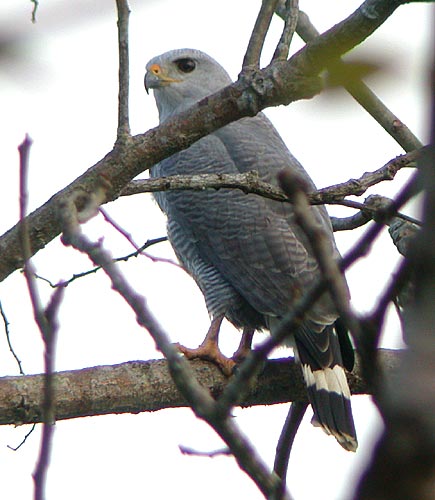Alternative name: Gray-lined Hawk
- Buteo nitidus
Identification
Adults are generally easily recognized by the gray-and-white barred underparts and broadly white-banded black tail.
Distribution
Found in the lowlands of the southern USA to northern Argentina and Brazil.
Northern range occupied by plagiatus: southern Arizona, New Mexico and Texas through Mexico and Central America south to Costa Rica where this form is found in large parts of the Caribbean lowlands and south to at least Jaco on the Pacific side.
Other races are found from southwest-most Costa Rica, through Panama and most of lowland N. and C. South America, as far south as SW Ecuador on the Pacific coast and N. Argentina east of the Andes.
See taxonomy section for notes on possible split.
Taxonomy
Subspecies
- B. n. plagiatus - Larger, darker and with more uniform upperparts than the following.
- B. n. costaricensis
- B. n. nitidus - Nominate race.
- B. n. pallidus
Asturina vs. Buteo
Formerly placed in the monotypic genus Asturina. Riesing et al. (2003) presented genetic data indicating that Asturina is nested within Buteo. This reclassification is supported by virtually all authorities since then: Banks et al. (2006), AOU (2006 supplement), Clements (2007), SACC (2006). The Opus follows in this consensus.
One or two species?
The taxon plagiatus was originally considered (and described as) a species, but some later authorities preferred to considered it a subspecies, often without published rationale, notably Peters (1931), which to various extent formed a basis for most later check lists. Sibley & Monroe (1990) returned to the original status in listing plagiatus as a species, but - just as earlier authorities generally provided little or no published evidence for changing plagiatus to subspecies status - Sibley & Monroe did not publish their rationale for considering it a species. Riesing et al. (2003), Howard & Moore (2003), and Clements (2007) do not recognize plagiatus as a full species, and the Opus follows in this consensus. If split, the following names and subspecies are assigned to the two:
- Gray Hawk (Buteo plagiatus). Monotypic.
- Gray-lined Hawk (Buteo nitidus). In addition to the nominate race, it includes races costaricensis and pallida.
Habitat
Woodland and forest, but sometimes in more open habitats with scattered trees. Mainly in lowlands, but locally up to 1800 m (5900 ft). Generally fairly common, but rarer in its limited US range.
Behavior
Feeds on a wide range of small animals, mostly reptiles, but also birds, rodents and insects.
References
- Clements, JF. 2011. The Clements Checklist of Birds of the World. 6th ed., with updates to August 2011. Ithaca: Cornell Univ. Press. ISBN 978-0801445019. Spreadsheet available at http://www.birds.cornell.edu/clementschecklist/downloadable-clements-checklist
- Birdforum thread discussing the taxonomy of Gray Hawk
- Birdforum thread discussing AOU proposals including one to split Gray Hawk in two parts
Recommended Citation
- BirdForum Opus contributors. (2024) Gray Hawk. In: BirdForum, the forum for wild birds and birding. Retrieved 19 April 2024 from https://www.birdforum.net/opus/Gray_Hawk





